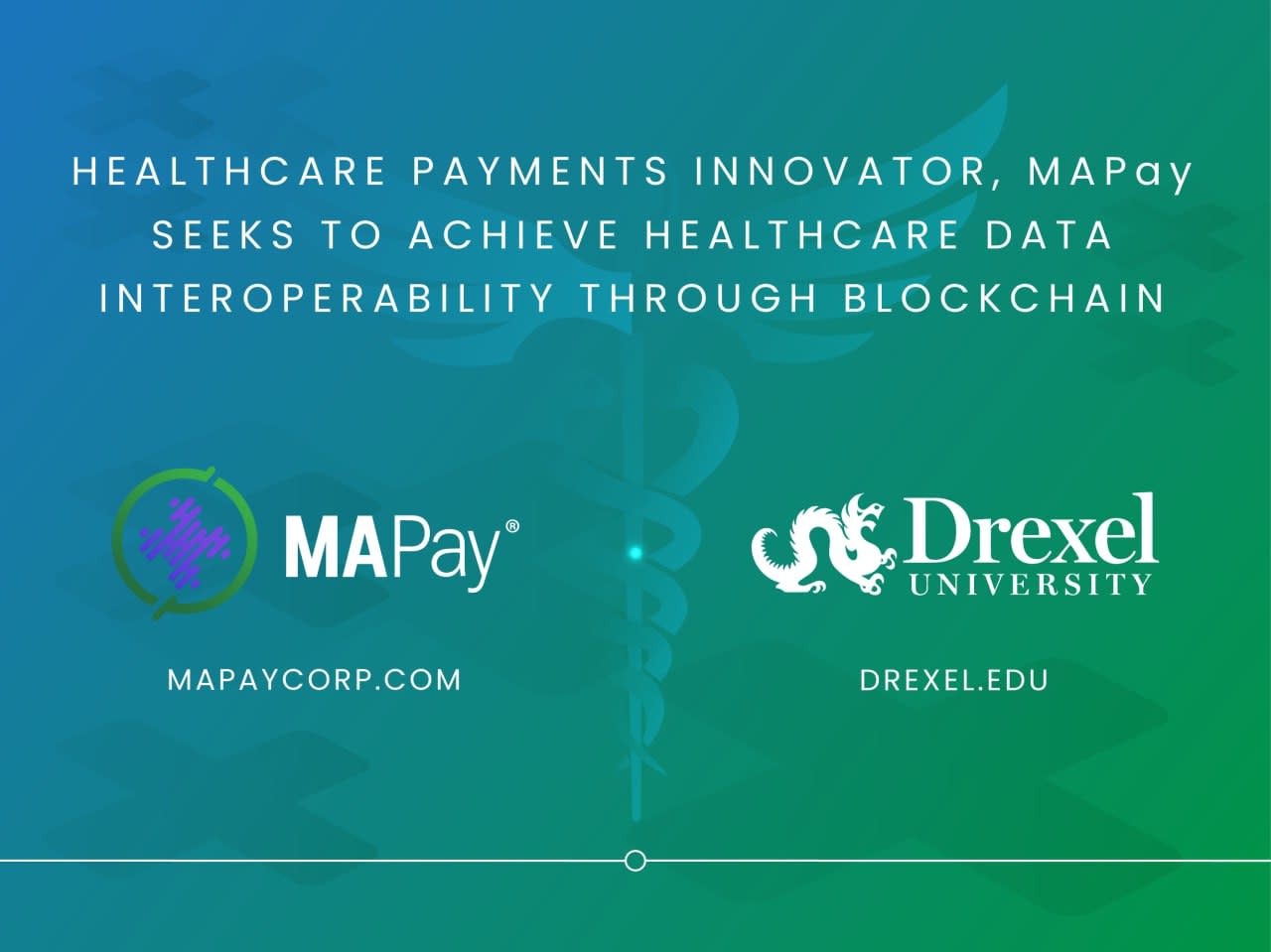
Drexel University College of Medicine and Healthcare Payments Innovator, MAPay, Seek to Achieve Healthcare Data Interoperability Through Blockchain
Philadelphia – Drexel University’s College of Medicine has announced a collaboration with MAPay, LLC, a global healthcare technology firm, to deploy a transformational healthcare payment and data exchange network that uses Non-Fungible Tokens (NFT’s) to democratize healthcare data.
The collaboration will develop the technical foundation and market to solve for one of the most debated and contentious healthcare topics, patient data access. In today’s world the patient does not truly own their own healthcare data and because of legacy healthcare data platform interoperability issues, a patient’s healthcare history is often incomplete or inconsistently accessible. When healthcare data is not complete or accessible, it negatively impacts the quality of care available to a patient, the use of critical information for medical research and development, and the administrative cost of billing and collecting healthcare payments. Despite significant industry and regulatory efforts to increase patient accessibility and transparency of medical records, regardless of their care provider, data is still not available to be used in such a way that it enhances research and treatment efforts and produces better medical outcomes.
Michael Dershem, aka “Dersh,” CEO of MAPay, asserts, “The medical industry has laid the groundwork for a solution to be realized, but they are still dependent upon inefficient, incumbent services to establish patient identity. Provider-to-provider identities are also not readily facilitated in today’s health systems, which creates administrative and cost burdens when credentialing providers. These shortcomings are due to numerous legacy technical and business complexities including, yet not limited to, costs, competition, and privacy issues surrounding industry interoperability. MAPay brings an economically and technically viable solutions by leveraging blockchain technologies with its innovations in providing verifiable identities via a digital ledger.”
A non-fungible token (“NFT”) is a blockchain-based asset which is not interchangeable with any other (not fungible) assets. The MAPay patient data vault which leverage the innovative Algorand blockchain, NFTs create immense potential to revolutionize healthcare by safely storing verifiable patient information and providing a more complete healthcare history to care teams and other required health services. The ability to integrate this data into healthcare models for predictive diagnostics through contextual biomarkers, facilitate employer reward mechanisms, and provide verifiable, but deidentified, patient data for public health assessment, will drive a new era in health-driven big data analysis and care.
“We are extremely excited about this collaboration with MAPay,” said Charles B. Cairns, MD, senior vice president of Medical Affairs and dean of the College of Medicine. “This initiative will be transformational particularly in underserved areas. It is not a question of should this be done it is an answer that it must be done for the future in medicine.” Further added Cairns, “Because this touches so many distinct aspects of healthcare, a multi-disciplinary approach is needed. We have built a mosaic of Drexel colleges including; Business, Medical and Technology and coupled with a private sector industry leader of the likes of MAPay is a tremendous sandbox for transformation.”
The model will also provide incentives and rewards to patients that choose to leverage their data for industry use. The structure of the data will allow simplified, more structured, ways to target users with a certain set of criteria needed for research, and the ability for patients to provide deidentified, verifiable data, for a fiscal reward. The pool of rich data and a marketplace to access it, creates an industry shifting paradigm in research and development outcomes.
The future promise of healthcare depends on the availability and sharing of patient data. Because of business and technology reasons, however, this data remains stuck in silos. Conventional approaches to aggregating healthcare information for impact in research and population health management have been plagued with the business, structural and regulatory conflicts of obtaining and using data. If this data could be accessed and used by a broader community, it could provide price transparency, anonymized data for research and cures, and limit societal medical costs related to fraud and abuse. MAPay and Drexel University College of Medicine will use transformational technologies to create transformational outcomes in patient care, research, and healthcare access.
Patient-centric data interoperability goes beyond enabling EHR’s to move data between one another or deriving relevant information from multiple unstructured data fields in many different systems. It puts the data into an individual’s control and creates a communal context by allowing NFT pools to be accessed and used for the greater health ecosystem. We will be changing Healthcare to Humancare, as it should be a global citizen and community,” Dershem ended.
About Drexel University Medical College
The latest move helps expand the geographic scope of one of the nation’s largest medical colleges. Today, Drexel University College of Medicine trains 1,100 medical students, 1 in 83 medical students in the United States. The college also spans 900 graduate students and 2,700 full-time, part-time, and volunteer faculty. In addition to its Philadelphia-based Queen Lane campus, the college opened a four-year regional medical campus, the College of Medicine at Tower Health in West Reading, in August 2021.
About MAPay
MAPay is a global healthcare fintech company that is deploying distributed ledger technology to power smart contracts, transacting secure medical solutions. The company has developed a hybrid architecture of both centralized and decentralized protocols for multi-party medical payments and HIPAA-compliant data exchange. MAPay is working in association with hospital networks, practice management systems, drug companies, insurance payers and government entities.
The company is committed to empowering patients and healthcare providers by leveraging blockchain technology to improve and align incentives, reduce costs, and bring increased transparency and data exchange. The company believes in permissionable open-sourced system collaboration, and solution sets that are economically and socially impactful. For more information, please visit https://www.mapaycorp.com/






